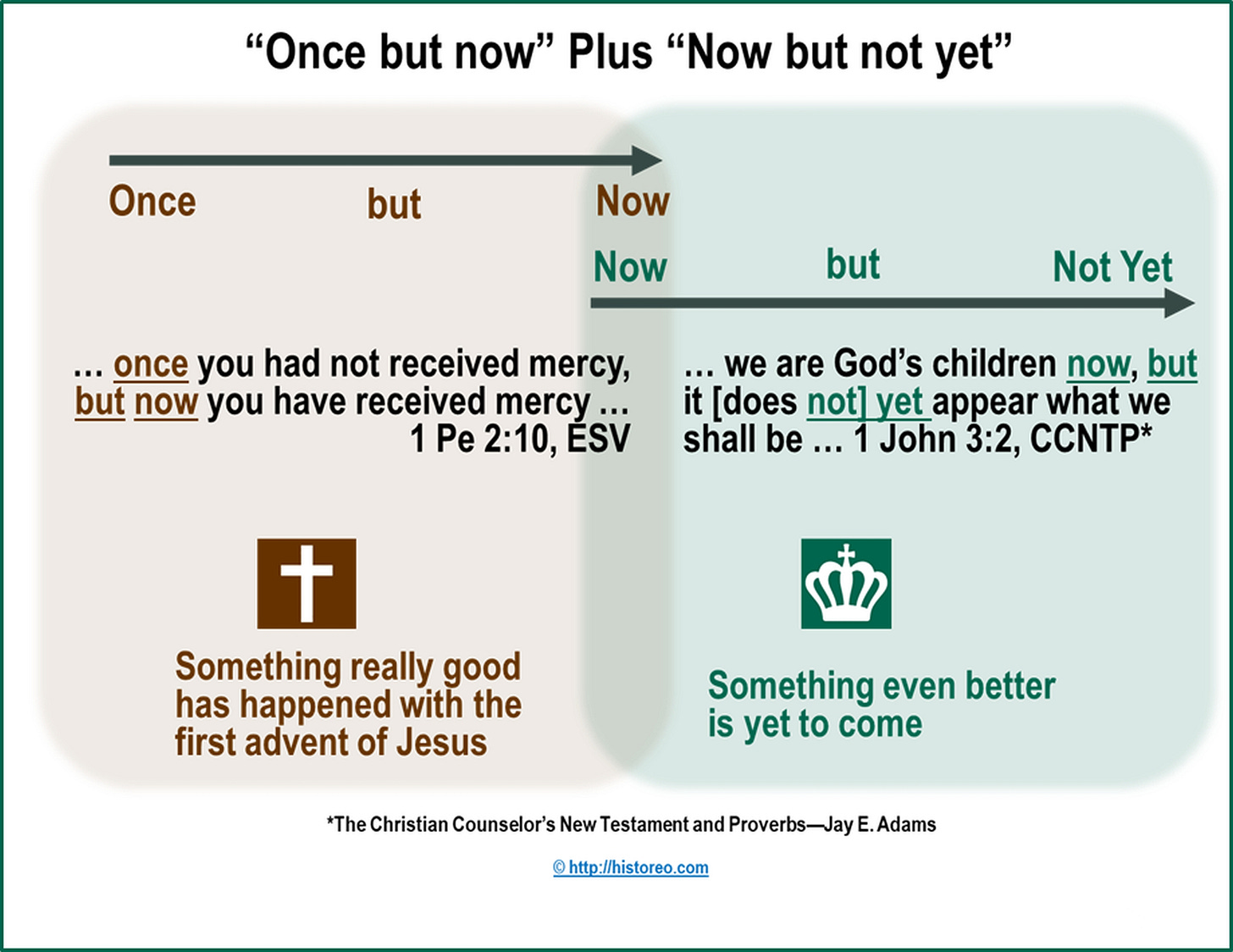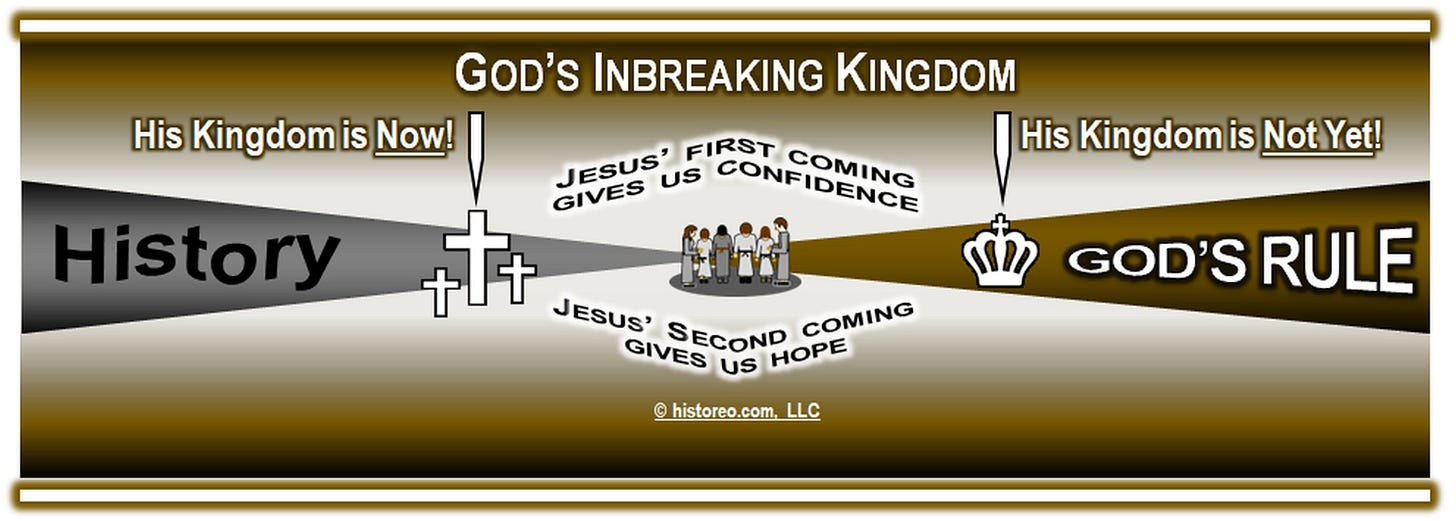We live in a post-Christian culture where patently absurd ideas are routinely indulged, often at the expense of traditional Christian beliefs. Even so, the prevalence of anti-Christian influences should not obscure the intriguing, if not stunning, nature of Christians claims. For example . . .
When we claim to be saved, but we still live in the hope of a yet-future salvation.
When we claim to have eternal life, but we still live in the hope of yet-future eternal life.
When we claim to have been resurrected to walk in a newness of life, but we still live in the hope of a yet-future resurrection.
When we claim cleansing from sin, but we still live in the hope of being cleansed from the sins that continue to beset us.
When we claim to be justified before God based on our faith alone, but we still face the test of a yet-future justification, not based on faith alone, but on a life lived in faithfulness.
When we claim the end-times outpouring of the Spirit has come, but we still live in the hope of a yet-future and even greater outpouring of the Spirit.
When we claim Jesus as Messiah has come, but we still live in hope of his yet-future second coming.
When we claim our Messiah rules, but we still live in the hope of seeing his rule fully realized.
When we claim God’s kingdom has come, but we still live in the hope of his coming kingdom.
When we claim to live in “the last days,” but after 2000 years, “the last days” have “lasted” way too long from the perspective of weak, albeit faithful believers, so we increasingly live in the hope of seeing “the last days” end and “the age to come” begin.
If all of the preceding claims are literally true in the present tense, then why do all of them remain the objects of our hope in the future tense? There is only one concept that makes perfect sense of that glaring contradiction: God’s inbreaking kingdom.
The preceding claims reflect a pattern, and God’s inbreaking kingdom best explains that pattern: The first coming of Jesus inaugurated the coming of God’s kingdom and the second coming of Jesus will consummate His kingdom’s coming. The inaugurating events are limited and provisional versions of the exhaustive and definitive events that will consummate the coming of His kingdom. So . . .
When we claim to be saved in the face of poverty, persecution, disease, and death, the truth of that claim is grounded in the concept of God’s inbreaking kingdom.
When we claim to have eternal life despite loneliness, deprivations, hardships, and betrayal, the truth of that claim is grounded in the concept of God’s inbreaking kingdom.
When we claim to have been resurrected to walk in a newness of life despite the relentless pull of our old way of life, the truth of that claim is grounded in the concept of God’s inbreaking kingdom.
When we claim to be cleansed from sin despite the sins that still beset us, the truth of that claim is grounded in the concept of God’s inbreaking kingdom.
When we claim to be justified by faith while admitting our even greater need for a future justification through a life lived in faithfulness, the truth of that claim is grounded in concept of God’s inbreaking kingdom.
When we claim the end-times outpouring of the Spirit has come while still hoping for a yet-future and even greater outpouring of the Spirit, the truth of that claim is grounded in the concept of God’s inbreaking kingdom.
When we claim the Messiah has come while still living in hope of his future return, the truth of that claim is grounded in the concept of God’s inbreaking kingdom.
When we claim our Messiah rules while living in the hope of his future rule, the truth of that claim is grounded in the concept of in God’s inbreaking kingdom.
When we claim God’s kingdom has come while still living in the hope of his coming kingdom, the truth of that claim is grounded in the concept of God’s inbreaking kingdom.
When we claim to live in “the last days” while still living in hope of “the last days” ending and “the age to come” beginning, the truth of that claim is grounded in the concept of God’s inbreaking kingdom.
God’s Inbreaking Kingdom is also the best explanation of a mystery not found in the OT but revealed in the NT. First-century Jews expected the conquering messiah envisioned in the OT: one who would conquer Israel’s enemies, cleanse the Temple, and restore the Law. Instead, they got a messiah named Jesus who was more along the lines of the Suffering Servant of Isaiah 53—one who was tortured and crucified—but was then amazingly resurrected and exalted into heaven while leaving His followers a promise He would come again a second time.
Hence we have the familiar two advents of Jesus. These two advents set the pattern of the "once but now" and the "now but not yet" passages of the NT. For example . . .
"Once you were alienated … [but] now you have been reconciled" (Col 1:21-22).
"Once were not a people … but now you are the people of God" (1 Pet 2:10).
. . .
alongside
"[Now God has] have put all things in subjection under [Jesus'] feet … but … not yet [do we] see all things subjected to him (Heb 2:8-9).
"Now we are children of God, but not yet does it appear what we shall be" (1 John 3:2).
. . .
Taken together, the "once but now" and "the now but not yet" passages come together in the idea that something good has already happened to God's people, and something even better is yet to come. The full realization of the coming kingdom is in the "yet" part of the "now but not yet." The “in-between” times of the present ages in the “now” part.
The two advents of Jesus are significantly different in scope and effect, the first advent foreshadows features of the second in dyads of parallel events that are profoundly significant. (See again Figure 1 above.) For example, we have first and second (1) comings of the Messiah (2) justifications, (3) judgments, (4) resurrections, (5) cleansings from sin, (6) experiences of eternal life, (7) experiences of salvation, (8) outpourings of the Spirit, etc.
The two elements of each dyad differ in that the first element is limited and provisional in its truth being dependent upon the yet-future fulfillment of its exhaustive and definitive counterpart at the second coming of Christ. For example, the salvation claimed in this present age counts for naught if not for the literal salvation that will accompany the yet-future second advent of the Messiah. The same is true for the first elements of all the dyads, hence the first advent of Jesus is understood as the inauguration of God’s inbreaking kingdom, while the second is the consummation of that inbreaking kingdom. In other words, the coming of God’s future reign began with Jesus’ first advent, and it will have completely come into being with Jesus’ second advent.
CAUTION: The phrase “inauguration of God’s inbreaking kingdom” is lengthy and it’s tempting to shorten it to “inauguration of God’s kingdom,” but that would be a mistake. The first advent of Jesus was NOT the inauguration of the kingdom—it was the inauguration of the coming [inbreaking] kingdom. The shortening error is even more misleading in reducing the phrase “consummation of God’s coming [inbreaking] kingdom” to “consummation of God’s kingdom” because the latter suggests God’s kingdom is completed with the second advent when the truth is its fullness will just be beginning.
Lest anyone miss the significance of “God’s inbreaking kingdom” as a template for understanding otherwise confusing contradictions in the NT, please understand the enduring truths (dependability) of all the blessings attendant to Christ’s first coming are grounded in the enduring truth (dependability) of “God’s inbreaking kingdom” being fully realized. In the first century, that was an astoundingly hard thing to believe, hence God gave first-century believers unambiguous and indisputable manifestations of the Spirit as a “guarantee” (e.g., 2 Cor 1:22), and that guarantee was so persuasive that today we casually make the same claims with no deep thought as to what we claim and no awareness of the metaphor (God’s inbreaking kingdom) that grounds them.
The explanatory power of “God’s Inbreaking Kingdom” clarifies if not solves many longstanding controversies. For example, how can God’s kingdom, eternal life, and salvation be both now and not yet? Why does Paul’s view of the relationship between works and justification differ from James’? What would be different if there had only been one advent of the Messiah?
Present-day preoccupation with individualism neglects scripture’s emphasis on the biblical question, “what is God doing in the world to save His people,” in preference for, “how can I as an individual be saved?” In the process, salvation has become disconnected from history, community, and moral significance. Truth is biblical salvation occurs within history in fulfillment of particular promises to a particular people through a particular Person. Thus, the whole world now exists in the “in-between” times separating the first and second advents of Israel’s Messiah, with each of those advents representing an important truth: Something extraordinarily good has happened with the first coming of Christ, and something even better is yet to happen with His second coming.
Until then, God’s people exist in the “in-between times” with Christ’s second advent as their hope and his first advent as their confidence in that hope. In the first century, the Spirit’s guarantee of the Christian hope was so compelling NT believers spoke of salvation, eternal life, resurrection, and so forth as if those claims were already a present reality in their fullness. It’s a good thing for us make such claims today, but it would be much better if we were to understand how “God’s inbreaking kingdom” makes sense of such astounding assertions.
—Bill Brewer
© historeo.com LLC










Thank you for sharing your excellent hard work of Christian scholarship. Your reasoning [love the infographics!] is strongly supported by Scripture and the good scholars you cite, IMHO. I'm glad to see this shared online again since it disappeared from that church site in Texas you are/were [?] affiliated with. You're not posting regularly, it seems, on Substack. Maybe on another platform?